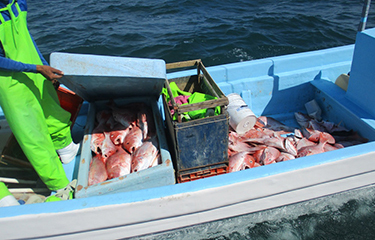US to ban port access to Mexican boats fishing in the Gulf of Mexico

Starting in February, NOAA Fisheries will enact a ban prohibiting port access for all Mexican fishing boats that operate in the Gulf of Mexico.
The federal agency said in a statement that the move, which will become effective Monday, 7 February, comes as the U.S. issued a “negative certification” against its southern neighbor for illegal, unreported, and unregulated (IUU) fishing in a report to Congress last August. American officials noted that they made the determination in 2019 after making similar determinations in 2015 and 2017.
“These vessels are known to catch finfish stocks that are regulated by the United States, including red snapper, as well as bycatch of protected sea turtles,” the report stated, noting that federal and Texas officials also reported “significant strandings of turtles” on Texas beaches.
In 2018, the U.S. imported nearly 4.8 million kilograms of fresh and frozen snapper from Mexico. Those shipments were valued at more than USD 33 million (EUR 29 million).
That led to suspicions that Mexican boats may have been harvesting snapper in American waters. The report determined that Mexico exercised greater control over licensed vessels in 2019, but continued to do little against unlicensed boats.
“The United States is committed to working with the government of Mexico to support its actions to address the issues identified in 2019 and 2021 and is ready to reestablish U.S. port privileges for Mexican fishing vessels operating in the Gulf of Mexico once actions are taken by Mexico,” NOAA Fisheries said in a statement announcing the ban.
The problem has continued, although some recent signs may point to a reduction.
In October 2019, the U.S. Coast Guard announced a record-breaking year for combating illegal fishing expeditions by Mexican lanchas for the 2019 fiscal year. That fiscal year, which ended in September 2019, found the Coast Guard intercepting 138 lanchas and interdicting 74.
In fiscal year 2020, the Coast Guard detected 326 lanchas and interdicted 136. That came after an “unprecedented” effort using aircraft, small boats, and cutters to increase the stoppages, USCG Lieutenant Commander Joseph Prado said in an October 2020 release.
In 2021, Coast Guard crews recorded 78 lanchas, seizing nearly 15,500 pounds of fish, and detained more than 200 fishermen.
"The last few years of record-breaking lancha interdictions speak to the steadfast commitment, professionalism, and teamwork of the Coast Guard crews and our partners at Texas Parks and Wildlife to this mission,” said USCG Lieutenant Commander Daniel Ippolito, commanding officer of the Coast Guard’s station at South Padre Island, Texas, in a December 2021 statement.
Stopping IUU fished products from entering the U.S. market has become a priority in Washington D.C. Besides NOAA Fisheries’ move to block Mexican boats in the Gulf of Mexico, a bipartisan bill in Congress also seeks to stop IUU practices by expanding the Seafood Import Monitoring Program to cover all species.
Environmental advocates hailed the decision, saying that Mexico needs to stop illegal fishing originating from inside the country.
“This time, Mexican officials didn’t stop boats from illegally entering U.S. waters to fish,” the Center for Biological Diversity said in a statement on Wednesday 12 January. “Last fall, they couldn’t get fishermen to use gear that protects imperiled sea turtles. The López Obrador administration can’t manage to stop rampant illegal fishing in the upper Gulf of California to save the endangered vaquita porpoise. The clear U.S. message is that the Mexican government has to clean up its fishing practice or lose a critical seafood trade partner.”
Photo courtesy of the United States Coast Guard






Share